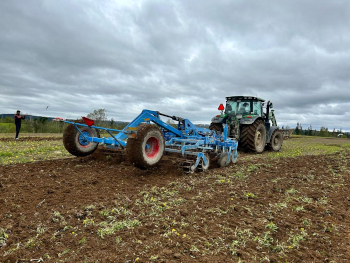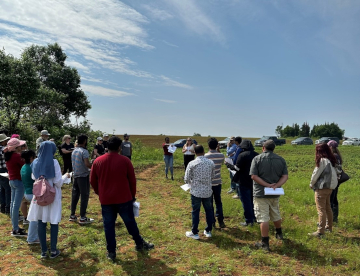
Newfoundland and Labrador Living Lab researchers are working directly with local farmers at every step of the project to speed up adoption of environmentally-friendly innovations.
Farmers across Canada face many challenges related to climate change, and see its impact first-hand. They have been finding new ways to protect the environment, in collaboration with researchers and other collaborators. Agriculture and Agri-Food Canada (AAFC) is working to strengthen the climate resiliency of our nation’s food systems through the Agricultural Climate Solutions (ACS) – Living Labs program.
The program takes a collaborative approach to agricultural innovation, bringing together farmers, researchers, and other collaborators to co-develop and test innovative practices and technologies focused on reducing greenhouse gas (GHG) emissions and sequestering carbon on agricultural land, as well as other environmental co-benefits to soil health, water quality and biodiversity. The program now has a nationwide network of 14 Living Labs.
One of the new ACS – Living Labs projects is taking root in Newfoundland and Labrador, with up to $3.8 million in funding from AAFC. The Newfoundland and Labrador Federation of Agriculture is leading the project with many partners including local farmers and researchers from Memorial University’s Grenfell Campus, the Newfoundland and Labrador Department of Fisheries, Forestry and Agriculture, as well as AAFC.
The Living Lab project encompasses much of the province with teams working in Labrador as well as western and eastern Newfoundland. The focus is on-farm innovation, testing, and continual improvement of beneficial management practices important to these regions and for the environment. In Newfoundland, farmers have expressed the desire to develop new ways of using cover crops to reduce GHG emissions and improve soil quality, as well as other soil nutrient and fertilizer management practices that build soil health and maintain clean watercourses. Living Lab activities in Labrador also aim to build organic matter in soil to retain nutrients using compost and biochar, carbon-rich materials made up of organic residues such as plants and wood waste that can provide added nutrients for plant growth. The ultimate objective is to reduce the sector’s carbon footprint through knowledge exchange between collaborators leading to quicker innovation and adoption of best management practices.
Focusing on farmers’ needs, the The Living Lab – Newfoundland and Labrador (LL-NL) involves farmers at every step. Farmers contribute knowledge and experience, while also co-developing and testing proposed innovations right on their fields, with the goal to develop a balanced and practical approach that can strengthen their bottom line while helping the environment.
"We are always looking to innovate, increase efficiency and reduce our inputs. Being part of the Newfoundland and Labrador Living Lab will help us do just that", says participating farmer, Ian Richardson.

Newfoundland and Labrador Living Lab collaborators touring a participating farmers’ field where innovation activities are taking place.
The Living Lab activities taking place on farms in the western region of Newfoundland are co-led by farmers, lead collaborator Newfoundland and Labrador Federation of Agriculture (Rodney Reid), and other partners from Memorial University Grenfell Campus (Dr. Yeukai Katanda) and the Newfoundland and Labrador Department of Fisheries, Forestry and Agriculture (Crystal McCall). The AAFC research team, co-led by Dr. Linda Jewell of the St. John’s Research and Development Centre, and Dr. Tobias Laengle of the Pest Management Centre support the implementation of project activities by collaborators and farmers in Labrador and the eastern region of Newfoundland.
Innovation activities focus on developing, testing and improving beneficial management practices such as how nitrogen can be used more efficiently, as well as the different types of cover crops, compost mixes, and biochar suitable for the region in order to capture carbon and reduce GHG emissions in horticultural crops, like carrots and potatoes. In addition to having positive effects on climate change, these management practices are also expected to have benefits on soil health, water quality and crop yield, as well as support climate-smart pest management and biodiversity. An important part of developing agricultural practices most suitable for adoption is studying their economic benefits while considering the unique challenges of agriculture in Newfoundland and Labrador.
The program is still in the process of recruiting local farmers to work together in creating, testing and evaluating best management practices. Anyone interested can reach out to the Newfoundland and Labrador Federation of Agriculture.
Learn more about Agricultural Climate Solutions – Living Labs program
Get more Agri-info
- Want more stories like this? Explore what else Agri-info has to offer.
- Interested in reporting on this story? Contact AAFC Media Relations at aafc.mediarelations-relationsmedias.aac@agr.gc.ca to arrange an interview with one of our experts.